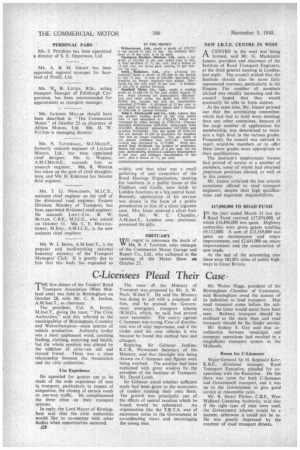GLicens . ees Plead Their Case T HE first dinner of the
Page 30

If you've noticed an error in this article please click here to report it so we can fix it.
Traders' Road Transport Association (West Midland area) was held in Birmingham on October 28, with Mr. C. E. Jordon, A.M.Inst.T., as chairman.
The president, Col. A. Jerrett, M.1nst.T., giving the toast, "The Civic Authorities," said this referred to the municipalities of Birmingham. Coventry and Wolverhampton—main centres of vehicle production. Authority to-day was a most unpleasant word, covering feeding, clothing, motoring and health, but the whole position was altered by the addition of civic—an old and trusted friend. There was a close relationship between the Association and the civic authorities.
Use Experience He appealed for greater use to be made of the wide experience of men in transport, particularly in respect of congestion, the closing of certain roads or one-way traffic. He complimenled the three cities on their transport systems.
In reply, the Lord Mayor of Birmingham said that the civic authorities would like to co-operate with other bodies when opportunities occurred.
The toast df the Ministry of Transport was-proposed by Mr. A. W. Nash, M.Inst.T. He said the Ministry was doing its job with a minimum of fuss, and he praised the Government emergency transport scheme (R.14.0.), which, he said, had proved most successful. The outcry against C-licensees was wrong.'Cost of distribution was of vital importance, and if the trader used his own vehicles it was because he found this method best and cheapest.
Replying. Sir Gilmour Jenkins. K.C.13., Permanent Secretary of the Ministry, said that limelight was being thrown on C-licensees and figures were being watched. The position had been explained with great wisdom by .the president of the Institute of Transport, Mr. David Lamb.
Sir Gilmour asked whether sufficient study had been given to the economics of traders running their own fleets. The growth was principally one of the effects of special taxation which he hoped would be ephemeral. An organization like the T.R.T.A. was of enormous value to the Government in co-ordinating views and encouraging the young men. Mr. Walter Higgs, president of the Birmingham Chamber of Commerce. said Birmingham owed the success of its industries to land transport. Had road transport come before the railways, the latter would never have been seen. Railway transport should be confined to the main lines and road transport should be the feeder service.
Mr. Sydney S. Guy said that coordination between municipal and company operations had resulted in a magnificent transport system in the Midlands.
Room for C-Licensees Major-General Sir H. Reginald Kerr, K.B.E., divisional manager, Road Transport Executive, pleaded for cooperation with the Executive. He felt there was room for both C-licensees and Government transport, and it was up to the Government to give good service at reasonable rates.
Mr. R. Stuart Pilcher, C.B.E., West Midland Licensing Authority, said that if the right type of man were used. the Government scheme would be a success; otherwise it could not be so. He was greatly impressed by the courtesy of road transport drivers.




















































































